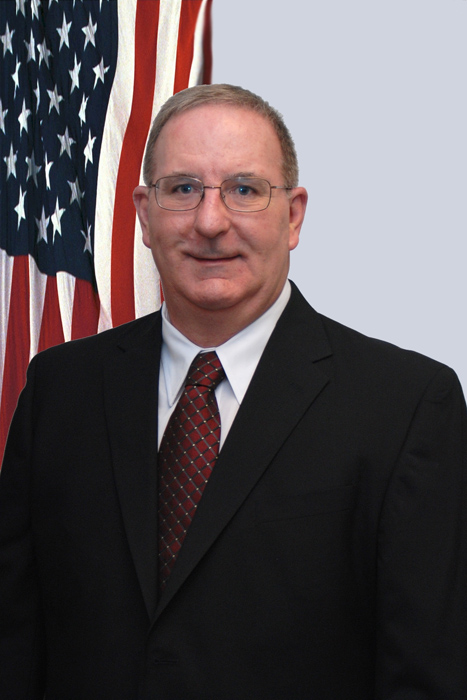USAMRIID Scientist Wins Department of Defense's Highest Civilian Honor
Leonard A. Smith, Ph.D., a senior scientist at the U.S. Army Medical Research Institute of Infectious Diseases (USAMRIID) at Fort Detrick, received the Department of Defense (DoD) Distinguished Civilian Service Award Nov. 18 in a Pentagon ceremony. The recognition is the highest award given by the Secretary of Defense to career employees.
Dr. Smith, an internationally recognized expert on botulinum neurotoxins and ricin toxin, serves as the Senior Research Scientist (ST) for Medical Countermeasures Technology, U.S. Army Medical Research and Materiel Command (USAMRMC), and as the Acting Scientific Director for USAMRIID. He has over 30 years of service to the Institute.
"Len is a proven visionary and leader, and his selection for this award is a great honor for him, for USAMRIID, and for the USAMRMC," said COL Erin P. Edgar, USAMRIID commander. "He has made tremendous contributions to the development of biodefense medical countermeasures for the Armed Services and for the entire nation."
According to his official biography, Dr. Smith's team is focused on translational medicine'developing vaccines and therapeutic drugs from concept and discovery, through early development, non-clinical and preclinical testing, and finally into clinical trials. His most recognized scientific contributions have been in the development of vaccine products to combat botulinum neurotoxins (BoNT) and ricin toxin.
He served as a key team member and later as leader in the development of a new generation of BoNT vaccines'designing novel recombinant botulinum toxin antigens, along with production processes for multiple toxin serotypes. Importantly, this approach offers the DoD the potential to develop a safe, effective, fully characterized vaccine that meets today's cutting-edge industry standards. Dr. Smith also is spearheading the advanced development of a lead ricin vaccine candidate that is currently in phase I clinical trials.
Dr. Smith attended Georgetown University in Washington, D.C., where he received his Ph.D. degree in Biochemistry in 1978. He received a BA degree in Chemistry and Zoology from the University of New Hampshire in 1972. He joined USAMRIID as a research chemist in 1982, having served in private industry and as a senior staff fellow at the National Cancer Institute. Prior to his 2008 appointment by the Secretary of the Army to the post of Senior Research Scientist (ST), Dr. Smith headed USAMRIID's Department of Molecular Biology within the Division of Integrated Toxicology.
Dr. Smith has authored or co-authored more than 150 scientific publications, reviews and book chapters, and holds several patents for his work. He is frequently invited to lecture at national and international meetings. He is Chair of NATO Human Factors and Medicine Task Groups 186 and 239. He is a member of the International Society on Toxinology, American Society for Microbiology, American Association of Pharmaceutical Scientists and PDA: An International Association for Pharmaceutical Science and Technology. He also serves on the Board of Directors and is an Officer for the International Neurotoxin Association.
His previous awards and honors include the 2011 Department of the Army Research and Development Achievement Award for Technical Excellence, the 2007 Joel M. Dalrymple Award from the Association of Military Surgeons of the United States, and the 2007 Research Scientist of the Year Award from the Defense Threat Reduction Agency. He was a finalist in the 2007 Service to America Awards, and was elected to the faculty of the Neurotoxin Institute in New York City in 2007. He received the Order of Military Medical Merit award in 2006 and the Army Research and Development Achievement Award in 1999.
While Dr. Smith was joined at the ceremony by wife Olga Hernandez-Smith, daughter Kristen Smith and grandson Logan Cresswell, the event also was tinged with sadness for one family member who was conspicuously absent. His son, Marine Sgt. David Smith, died in January 2010 from injuries he sustained during a suicide bombing in Afghanistan. He was 25.
"This award comes with sadness, as well as honor," Dr. Smith said. "I have always tried to do the best that I could in support of our warfighters. They are the ones who work so hard and sacrifice so much. That's what keeps me going'to support those who put themselves in harm's way to keep us safe, as my son did for love of country, service and family. My son loved the U.S. Marine Corps and was extremely proud to serve his country."
USAMRIID's mission is to protect the warfighter from biological threats and to be prepared to investigate disease outbreaks or threats to public health. Research conducted at USAMRIID leads to medical solutions'vaccines, drugs, diagnostics, and information'that benefit both military personnel and civilians. The Institute plays a key role as the lead military medical research laboratory for the Defense Threat Reduction Agency's Joint Science and Technology Office for Chemical and Biological Defense. USAMRIID is a subordinate laboratory of the U.S. Army Medical Research and Materiel Command.
 An official website of the United States government
An official website of the United States government
 ) or https:// means you've safely connected to the .mil website. Share sensitive information only on official, secure websites.
) or https:// means you've safely connected to the .mil website. Share sensitive information only on official, secure websites.



